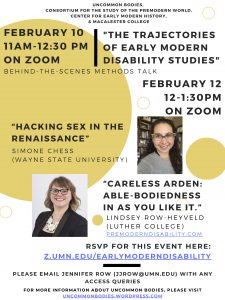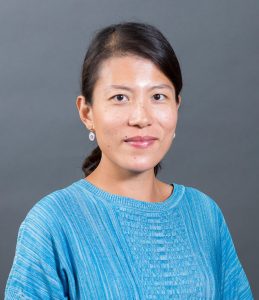Uncommon Bodies: Now Accessible Via Zoom!
Contact
The Words: Macalester's English Student NewsletterSenior Newsletter Editors:
Birdie Keller '25
Daniel Graham '26
Callisto Martinez '26
Jizelle Villegas '26
Associate Newsletter Editors:
Ahlaam Abdulwali '25
Beja Puškášová '26
Sarah Tachau '27
Peyton Williamson '27
by Malcolm Cooke ’21
“Orlando is absolutely a bro,”
Lindsey Row-Heyveld was answering questions following her talk “Careless Arden: Ablebodiedness in ‘As You Like It.’” Orlando’s ‘bro-ness’ was in reference to the role hyper-masculinity played in constructions of able-bodiedness in the Shakespeare play.

The February 12 talk explored the valorization of able-bodiedness, and how conditions and norms of “carelessness” produce the category of disability in early modern society and theatre.
The presentation was part of a series of discussions organized by Uncommon Bodies, a research and reading group organized by Jennifer E. Row, assistant professor of French at the University of Minnesota, and Macalester English Department’s own Assistant Professor Penelope Geng.
“As Lindsey’s arguing, we’re acting like normative things are naturalized, like able-bodiedness,” Simone Chess, the second presenter at the event, said. Referring to her own earlier talk she commented, “we’re careless about sex and in doing that we ourselves, just like I’m saying early moderns did, are not paying attention to the ways that disability knowledges are informing the ways that we’re having or thinking about sex.”
Chess’ talk “Hacking Sex In The Renaissance” went deep into the networks of knowledge and experience Queer and Disabled people have about sex, which are perceived by cis-hetero society as allowing them to unlock “next level sexual proficiencies.”
Professor Geng has been working on Uncommon Bodies with Row over the last two years, engaging with a number of Disability and Early Modern Studies scholars with the aim of fostering community, discussion, and guidance in the burgeoning field.
“Our intention was to create a place where we can find a community of people who are interested in early modern studies as well as disability studies and performance and embodiment and emotions,” Professor Geng said. “I’ve always thought of uncommon bodies as having these different thematic interests and disability, embodiment, emotions, performance they’re all intertwined.”
The original spark of Uncommon Bodies came during Geng’s independent research. Near the end of writing and drafting her book on sabbatical in Spring 2019, Geng found her interests gravitating towards the history of the body and emotions, and the ways they play out in early modern legal systems and society. To explore this deeper, she wanted to connect with the Twin Cities scholarly community on disability, embodiment, and performance. Speaking to JB Shank, a professor of the history of science at the University of Minnesota, JB put Geng in contact with Professor Row, and a suggestion to utilize funding from the Consortium for the Study of the Premodern World (CSPW) to set up a cross-campus reading workshop.
Professor Geng was excited for the group to exist beyond the scope of just Macalester but didn’t want Uncommon Bodies to be exclusive to any institution.

“I was adamant that it wouldn’t be just a Macalester thing or just a University of Minnesota thing, but that we would collaborate and decentralize, like decamp to various places in the Twin Cities,” Geng said. “I’m such a fan of MIA, Minneapolis Institute of Art. I always feel so at home in their galleries and their spaces, so I thought well maybe we could have one of our meetings at MIA”
The first meeting was a success, with visitors from all over, including several Mac alums and people from Carleton College and St. Olaf.
“And we just continued from there,” Geng said.
In 2019 Uncommon Bodies had four workshop meetings and in February of 2020, they held a mini conference.
Now, in the next spring of quarantine, Uncommon Bodies is still going strong. The virtual nature has even been an unexpected boon to the group’s goals of accessibility and decentering its focus from any one specific place or institution.
“It worked out really well because we were able to have people dial in from all over the world. Somebody zoomed in from Scotland, from New York, from the west coast, from Canada,” Geng said.
“I’m wondering if Uncommon Bodies should, even after we are able to return to an in-person situation, continue the virtual format because it just seems like it’s really hitting that goal of accessibility, of bringing people who may not be able to travel who cannot participate in person for whatever reason,” Geng said. “This gives them an opportunity to still find community and exchange ideas and share papers.”
Indeed, on February 12 the presenters answered a wide range of questions from participants all over the country. Undergrads, graduate students, professors, and more were in attendance, realizing the goals of Uncommon Bodies to not just provide a space for academic discourse, but mentorship, community building, and expansion of the field of disability studies.
The two speakers were obvious picks for this.
“Simone and Lindsey’s names just kind of naturally came to the fore,” Geng said. ““Lindsey published a really awesome book called ‘Dissembling Disability in Early Modern English Drama’ and both Jennie and I read it and we loved it and Simone is somebody who has such a reputation for mentoring folks beyond her institution. She’s been in the field for a while and everything I heard about her was just glowing. So I got the feeling that both of them would be excited by the opportunity to not just share research but also ultimately to be part of this community.”
And Uncommon Bodies’ discussions of disability studies are making their way back into the Macalester community as well. Geng is developing a new 300 level course for the Macalester English Department called “Disability in the English Renaissance.” Equipped with the vast array of scholarship on Disability Studies from Uncommon Bodies and beyond, the issue is no longer finding what to read, but narrowing it down. Uncommon Bodies has shown Professor Geng that disability is a lens through which just about any text can be read, “So the challenge will be to figure out which texts I want to put on the syllabus,” Geng said.